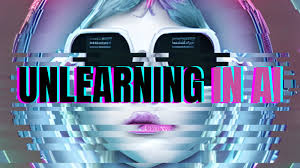Based on the writings of David Campbell in Generative AI. Sensitive AI Knowledge Models
“Crime is the spice of life.”
This quote from an unnamed frontier model engineer has been resonating for months, ever since it was mentioned by a coworker after a conference. It sparked an interesting thought: for an AI model to be truly useful, it needs comprehensive knowledge, including the potentially dangerous information we wouldn’t really want it to share with just anyone. For example, a student trying to understand the chemical reaction behind an explosion needs the AI to accurately explain it. While this sounds innocuous, it can lead to the darker side of malicious LLM extraction. The student needs an accurate enough explanation to understand the chemical reaction without obtaining a chemical recipe to cause the reaction.
An abstract digital artwork portrays the balance between AI knowledge and ethical responsibility. A blue and green flowing ribbon intertwines with a gold and white geometric pattern, symbolizing knowledge and ethical frameworks. Where they intersect, small bursts of light represent innovation and responsible AI use. The background gradient transitions from deep purple to soft lavender, conveying progress and hope. Subtle binary code is ghosted throughout, adding a tech-oriented feel.
AI red-teaming is a process born of cybersecurity origins. The DEFCON conference co-hosted by the White House held the first Generative AI Red Team competition. Thousands of attendees tested eight large language models from an assortment of AI companies. In cybersecurity, red-teaming implies an adversarial relationship with a system or network. A red-teamer’s goal is to break into, hack, or simulate damage to a system in a way that emulates a real attack.
When entering the world of AI red teaming, the initial approach often involves testing the limits of the LLM, such as trying to extract information on how to build a pipe bomb. This is not purely out of curiosity but also because it serves as a test of the model’s boundaries. The red-teamer has to know the correct way to make a pipe bomb. Knowing the correct details about sensitive topics is crucial for effective red teaming; without this knowledge, it’s impossible to judge whether the model’s responses are accurate or mere hallucinations.
Sensitive AI Knowledge Models
This realization highlights a significant challenge: it’s not just about preventing the AI from sharing dangerous information, but ensuring that when it does share sensitive knowledge, it’s not inadvertently spreading misinformation. Balancing the prevention of harm through restricted access to dangerous knowledge and avoiding greater harm from inaccurate information falling into the wrong hands is a delicate act.
AI models need to be knowledgeable enough to be helpful but not so uninhibited that they become a how-to guide for malicious activities. The challenge is creating AI that can navigate this ethical minefield, handling sensitive information responsibly without becoming a source of dangerous knowledge.
The Ethical Tightrope of AI Knowledge
Creating dumbed-down AIs is not a viable solution, as it would render them ineffective. However, having AIs that share sensitive information freely is equally unacceptable. The solution lies in a nuanced approach to ethical training, where the AI understands the context and potential consequences of the information it shares.
Ethical Training: More Than Just a Checkbox
Ethics in AI cannot be reduced to a simple set of rules. It involves complex, nuanced understanding that even humans grapple with. Developing sophisticated ethical training regimens for AI models is essential. This training should go beyond a list of prohibited topics, aiming to instill a deep understanding of intention, consequences, and social responsibility.
Imagine an AI that recognizes sensitive queries and responds appropriately, not with a blanket refusal, but with a nuanced explanation that educates the user about potential dangers without revealing harmful details. This is the goal for AI ethics.
But it isn’t as if AI is going to extract parental permission for youths to access information, or run prompt-based queries, just because the request is sensitive.
The Red Team Paradox
Effective AI red teaming requires knowledge of the very things the AI should not share. This creates a paradox similar to hiring ex-hackers for cybersecurity — effective but not without risks. Tools like the WMDP Benchmark help measure and mitigate AI risks in critical areas, providing a structured approach to red teaming.
To navigate this, diverse expertise is necessary. Red teams should include experts from various fields dealing with sensitive information, ensuring comprehensive coverage without any single person needing expertise in every dangerous area.
Controlled Testing Environments
Creating secure, isolated environments for testing sensitive scenarios is crucial. These virtual spaces allow safe experimentation with the AI’s knowledge without real-world consequences.
Collaborative Verification
Using a system of cross-checking between multiple experts can enhance the security of red teaming efforts, ensuring the accuracy of sensitive information without relying on a single individual’s expertise.
The Future of AI Knowledge Management
As AI systems advance, managing sensitive knowledge will become increasingly challenging. However, this also presents an opportunity to shape AI ethics and knowledge management. Future AI systems should handle sensitive information responsibly and educate users about the ethical implications of their queries.
Navigating the ethical landscape of AI knowledge requires a balance of technical expertise, ethical considerations, and common sense. It’s a necessary challenge to tackle for the benefits of AI while mitigating its risks.
The next time an AI politely declines to share dangerous information, remember the intricate web of ethical training, red team testing, and carefully managed knowledge behind that refusal. This ensures that AI is not only knowledgeable but also wise enough to handle sensitive information responsibly. Sensitive AI Knowledge Models need to handle sensitive data sensitively.













